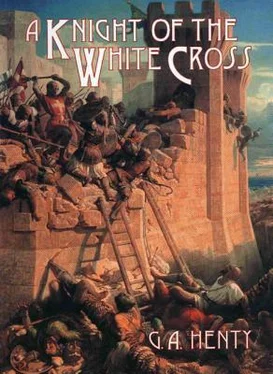At eight o'clock the bells of St. John's Church gave notice that a solemn service of thanksgiving for the repulse of the enemy was about to be held. Notice had been sent down early to the tower; and all the knights who could be spared, without too greatly weakening the garrison, went up to attend it; the service was conducted with all the pomp and ceremony possible, and after it was over a great procession was formed to proceed to the shrine, where a picture of the Virgin held in special reverence by the Order was placed.
As it wound through the streets in splendid array, the grand master and officials in all their robes of state, the knights in full armour and the mantles of the Order, while the inhabitants in gala costume lined the streets, windows, and housetops, the ladies waving scarves and scattering flowers down on the knights, the roar of great cannon on the south side of the city showed that the Turks had commenced the attack in another quarter. Without pausing, the procession continued its way, and it was not until the service in the chapel had been concluded that any steps were taken to ascertain the direction of the attack. As soon as it was over, the knights hastened to the walls. During the night the Turks had transported their great basilisks, with other large pieces of artillery, from the camp to the rising ground on the south side of the city, and had opened fire against the wall covering the Jews' quarter, and at the same time against the tower of St. Mary on the one hand and the Italian tower on the other.
From other commanding spots huge mortars were hurling great fragments of rock and other missiles broadcast into the town. The portion of the wall selected for the attack showed that the Turks had been well informed by their spies of the weak points of the defence. The wall behind which the Jews' quarter lay, was, to all appearance, of thick and solid masonry; but this was really of great age, having formed part of the original defences of the town, before the Order had established itself there. The masonry, therefore, was ill fitted to resist the huge balls hurled against it by the basilisks. The langue of Provence was in charge of this part of the wall, and, leaving them for the present to bear the brunt of the storm, the grand master sent the knights who could be spared, to assist the inhabitants to erect shelters against the storm of missiles falling in the town.
Sheds with sharply sloping roofs, constructed of solid timber, were built against the inner side of the walls, and beneath these numbers of the inhabitants found refuge. The work was performed with great celerity by the inhabitants, aided by the gangs of slaves, and in two or three days the townspeople were all in shelter, either in these sheds, in the vaults of the churches, or in other strongly constructed buildings.
Among the missiles hurled into the town were balls filled with Greek fire, but the houses being entirely built of stone, no conflagrations of importance were caused by them, as a band of knights was organised specially to watch for these bombs, and whenever one of them was seen to fall, they hurried from their lookout to the spot, with a gang of slaves carrying baskets of earth and buckets of water, and quenched the flames before they had made any great headway.
The roar of the bombardment was almost continuous, and was heard at islands distant from Rhodes, telling the inhabitants how the battle between the Christians and the Moslems was raging.
It was not long before the wall in the front of the Jews' quarter began to crumble, and it was soon evident that it must, ere many days, succumb to the storm of missiles hurled against it. D'Aubusson lost no time in making preparations to avert the danger. He ordered all the houses in rear of the wall to be levelled; a deep semicircular ditch was then dug, and behind this a new wall, constructed of the stones and bricks from the houses destroyed, was built, and backed with an earthen rampart of great thickness and solidity.
The work was carried on with extraordinary rapidity. The grand master himself set the example, and, throwing aside his robes and armour, laboured with pick and shovel like the commonest labourer. This excited the people to the highest pitch of enthusiasm, and all classes threw themselves into the task. Knights and slaves, men, women, and children, and even the inmates of the convents and nunneries, aided in the work, and when at last the outer wall fell, and the Turks thought that success was at hand, the pasha saw with astonishment and dismay that entry to the city was still barred by a work as formidable as that which he had destroyed at an enormous expenditure of ammunition. There was now a short breathing time for the besieged; but the depression which the failure of their efforts excited among the Turks, was shortly dispelled by the arrival of a ship, with a despatch from Constantinople, in which the pasha was informed that the sultan himself was about to proceed to Rhodes with a reinforcement of a hundred thousand men, and a fresh park of artillery.
Paleologus had some doubts as to whether the report was true or was merely intended to stimulate him to new efforts for the speedy capture of the place. Knowing well that the grand master was the heart and soul of the defence, and that the failure of the assault was mainly due to his energy and ability, he determined to resort to the weapon so frequently in use in Eastern warfare — that of assassination. To this end he employed two men, one a Dalmatian, the other an Albanian; these presented themselves before the walls as deserters, and as there was no reason for suspecting their tale, they were admitted within the gates, and welcomed as having escaped from enforced service. They soon spread the tale of the speedy coming of the sultan with vast reinforcements, and as the pasha had on the previous day caused salutes to be fired, and other demonstrations to be made, the news was readily credited, and caused the greatest dismay among the defenders.
Some of the knights of the Italian and Spanish langues believed the prospect of a successful defence against so enormous a force was absolutely hopeless, and determined to put pressure upon D'Aubusson to treat for surrender before it became too late. They opened negotiations with an Italian named Filelfo, one of D'Aubusson's secretaries, who undertook to lay their opinion before the grand master. D'Aubusson at once summoned the knights concerned in the matter before him. They found him with several members of the council.
"Sir Knights," he said, "I have heard from my secretary your opinions in the matter of a surrender, and since you are in such terror of the Moslem sultan, you have my full permission to leave the town; and, more than that, I will myself secure your safe departure, which might be imperilled if your comrades or even the inhabitants of the town came to learn that you had advocated surrender; but," he went on, changing his tone from that of sarcasm to sternness, "if you remain with us, see that the word surrender never again passes your lips, and be assured that, should you continue your intrigues, in that direction, you shall meet with the fate you so justly deserve."
Overwhelmed by the grand master's accusation and sternness, the Italian and Spanish knights threw themselves on their knees and implored him to grant them an early opportunity of retrieving their fault by battle with the infidel. Feeling that the lesson had been sufficiently severe, and that henceforth there would be no renewal of intrigues for a surrender, D'Aubusson forgave them, and promised them a place in the van when next the Moslems attacked. The incident was not without its advantage, for the two pretended deserters, believing that Filelfo, who had also fallen under the displeasure of the grand master, would be ready to join in the conspiracy against his life, approached him. Filelfo, who was greatly attached to D'Aubusson, saw by their manner that they wished to engage him in some intrigue, and, feigning great resentment and anger at his disgrace, led them on until they divulged the entire plot for D'Aubusson's assassination, and made brilliant offers to him if he would afford them facilities for carrying it out, producing, in proof of their power to do so, a letter of the pasha, authorising them to make such promises in his name.
Читать дальше












